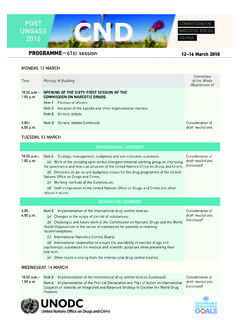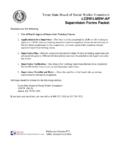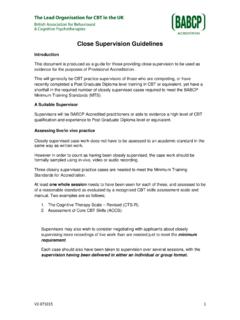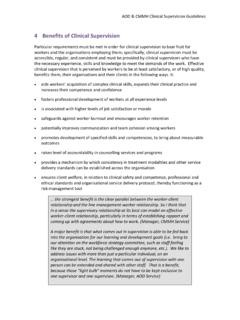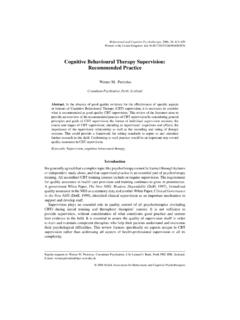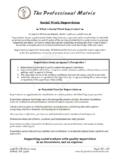Transcription of SERIES 20 Models of Clinical Supervision
1 OCTOBER 2005 VOLUME 8, ISSUE 10 PLEASE COPY OR POSTI deas for Treatment ImprovementNorthwest FrontierAddiction TechnologyTransfer Center810 D Street NESalem, OR 97301 Phone: (503) 373-1322 FAX: (503) 373-7348A project ofOHSUD epartment of PublicHealth & PreventiveMedicineSteve Gallon, ,Principal InvestigatorWendy Hausotter, MPHP roject DirectorMary Anne Bryan, sure to check out our web page science,education and services totransform livesSERIES 20 Clinical Supervision - Part 1 Models of Clinical Supervision A leader takes people wherethey want to go. A great leadertakes people where they don tnecessarily want to go butought to be. ~ Rosalynn Carter (1927-) ~Substance abuse treatment agenciesare increasingly feeling the pressureto demonstrate positive outcomeswith their clients.
2 Appropriately trainedclinical supervisors, who can support theongoing education and development ofstaff counselors, are a key part of thisprocess. The next three issues of theAddiction Messenger will explore variousmodels of Supervision , discuss theimportance of ongoing Supervision anddescribe the roles of both the supervisorand supervisee in the you, as a counselor, hear the word Supervision you may feel uncomfortableor even threatened. Clinical supervisorsmay also feel the same way, and mayapproach Supervision as something thathas to be done . Clinical Supervision canbe a beneficial experience that canenhance the professional growth andconfidence of both the supervisor and thesupervisee.
3 Keep in mind that the goal ofthe Clinical Supervision process, ultimately,is to enhance and support the best clinicalskills and lead to improved outcomes Is Clinical Supervision ?There are several definitions of Clinical su-pervision. Bernard and Goodyear (1998)offer this definition that has come to be ac-cepted within the counseling profession: Supervision is an intervention thatis provided by a senior member of aprofession to a junior member ormembers of that same relationship is evaluative, ex-tends over time, and has the simulta-neous purposes of enhancing theprofessional functioning of the jun-ior member(s), monitoring the qual-ity of professional services offered tothe clients she, he, or they see(s), andserving as a gatekeeper of those whoare to enter the particular profes-sion.
4 Another definition by Powell, D. &Brodsky A. (2004) states that: Clinical Supervision is a disciplined,tutorial process wherein principlesare transformed into practical skills,with four overlapping foci: adminis-trative, evaluative, Clinical and sup-portive. There are important differences betweenclinical Supervision , administrative super-vision and counseling: Clinical Supervision emphasizes improv-ing the counseling skills and effectivenessNFATTC ADDICTION MESSENGER OCTOBER 20052 PAGEof the supervisee. Administrative Supervision emphasizes conformitywith administrative and procedural aspects of theagency s work (eg. using correct formats for documen-tation, and complying with agency leave policies).
5 Clinical Supervision emphasizes developing counse-lor effectiveness through positive changes in knowledge,attitudes and skills. It is not a counseling or treatmentrelationship. Both supervisor and supervisee should know that thesupervisor will only intervene to improve performance,not to be unnecessarily critical or arbitrary. A Clinical supervisor has a role as expert, authority,mentor and representative of the treatment agency inrelationship to the counselor. Quality Supervision is based on a relationship that isrespectful, is clear regarding authority and accountabil-ity, and involves clear expectations for each ModelsDevelopmental Models of Clinical Supervision proposethat supervisees pass through several developmentalstages that supervisors need to take into account, forexample, Stoltenberg, McNeil, and Delworth s Inte-grated Developmental Model (IDM) of Clinical su-pervision, proposes 3 distinct levels of counselor devel-opment:Level 1 Level 1 counselors who are just entering the field, takein theories about therapy and assimilate them accordingto their own personal experiences.
6 They may be anx-ious about being a counselor, their lack of seasoned skillsand knowledge, and the fact that they are being regu-larly evaluated, but their motivation level is Interventions Observation is crucial for Level I counselors. Relyingon self-reports isn t sufficient because, at this level,counselors may not always perceive accurately whatthey are doing in a session with a client. Observationshould be direct, , in person, by videotape, or at leastby audio tape. In the next issue we will describe a feed-back technique, based on this observational approach,that Clinical supervisors can use to clearly and effec-tively coach staff counselors. While skills training can help entry level counselorsgain confidence, additional interpretation and supportfrom supervisors will be necessary for skills to reallytake hold.
7 Group Supervision can provide a good training groundin which the Level 1 counselor can learn from their 2 The Level 2 counselor generally emerges a year or twoafter graduation, with consistent Supervision during thistime. Level 2 counselors become increasingly comfort-able with a range of skills, and may begin to explore vari-ous approaches and current InterventionsLevel 1 interventions can be used, but less frequently forLevel 2 counselors. Counselors should be challenged toprovide reasons for using certain interventions with should provide strong support and empathy forthe Level 2 counselor, and constructive feedback shouldbe sandwiched between positive statements regardingtheir growth and at this level start to develop a readiness andopenness that allows for discussion and processing theirpersonal issues related to self-awareness, defensiveness,transference and countertransference, and the supervisoryrelationship.
8 The supervisor should provide a balance be-tween supporting and mentoring the supervisee, and fos-tering their independence and 3 Counselors at this level empathize with and understand theirclient s view of the world which allows them to exploreimportant information while discarding the irrelevant. Au-tonomy increases at this level and the supervisory relation-ship becomes more InterventionsThis level of counselor will benefit from more facilitativeactions such as support, caring, and even confrontation,when developmental model of Supervision , the Skovholtand Ronnestad Model, looks at a supervisee s growththroughout the lifespan. The eight stages they suggest arebriefly described below.
9 If you are a supervisor, you maywant to reflect on these and think about which stage ofgrowth your supervisees may be in. Would this informa-tion affect your supervison style? If you are a superviseereading about these stages, do you see yourself? Howmight this information help you and your supervisor makeyour Supervision more effective?Stage 1: CompetenceCounselors at this stage, having some experience with cli-ents, use what they already know - a conceptual modelbased on common sense .Stage 2: Transition to Professional Training(First year of graduate school)NFATTC ADDICTION MESSENGER OCTOBER 20053 PAGE Models of Supervision (cont.) Next Issue:You Can Receive the Addiction Messenger Via E-Mail !
10 Just send an e-mail to Mary Anne Bryan at asking to be put on the Addiction Messengermail or e-mail list or visit our website at to subscribe. Earn Continuing Education Hours by Reading the Addiction Messenger. Visit our website at Click on the Addiction Messenger button, then go to the first issue inthe SERIES you would like to earn CEUs for and scroll down to the registration form for more detailed :Bernard & Goodyear, B. (1998). Fundamentals of Clinical Supervision . (2nd ed.). Boston: Allyn & , S. (2002) Clinical Supervision : Building Chemical Dependency Counselor Skills. Portland, OR: Northwest , D. & Brodsky, A. (2004). Clinical Supervision in Alcohol and Drug Abuse Counseling: Principles, Models , Methods.








